
Oliver Knussen leads Elliott Carter on stage |
What artist was ever blessed with a longer creative life than Elliott Carter, who died in his New York apartment on Monday, November 5, just a month short of his 104th birthday? He was one of the major Modernist composers (who's left now besides Pierre Boulez?), and he bequeaths a stunning legacy of symphonies, concertos, chamber music, song cycles, choral music, and a single opera (What Next?), composed when he was nearing 90. Some might say (and I would agree) that he was America's greatest classical composer, though he was far from its most popular.
In Boston he had a particularly complicated history. I remember 40 years ago, waiting on a long line to get into a free performance of the Julliard String Quartet playing Carter's new Quartet No. 3, at Sanders Theatre. The packed hall greeted this challenging piece with cheers and a standing ovation. But when James Levine, as music director of the Boston Symphony Orchestra, championed Carter and commissioned new work from him, part of the audience balked, despite devout enthusiasm from those of us who love Carter's music (an audience, I'm sorry to say, that includes concertgoers who consider even Bartók and Stravinsky too avant-garde).
Yet Boston's new-music groups, especially Richard Pittman's Boston Musica Viva, continue to give memorable Carter performances (BMV's magnificent version of A Mirror on Which To Dwell, Carter's Elizabeth Bishop cycle, in 1977, was one of the best Carter performances I've ever heard), and some of the younger groups, including the Borromeo Quartet (which gave an astounding performance of the 45-minute Quartet No. 1), and the visiting Pacifica (which has recorded all five Carter quartets and played one at a recent Longy concert), have taken up the cause. Some of the high points of Carter's entire career have to include Monadnock Music's James Bolle (another Carter champion) leading the 2002 American premiere at Sanders Theatre of Carter's largest work, the epic Symphonia: sum fluxae pretium spei ("I am the prize of fleeting hope"); and in 2008, the 100th-birthday tribute to Carter, to whose work the entire Festival of Contemporary Music at Tanglewood was devoted. Levine planned it, though sadly his injuries and illness kept him from participating.
Carter was not new to Boston. He spent his student days here — as a Harvard undergraduate (an English major), then as a student at the Longy School. He'd met and admired the music of Charles Ives, a composer who surely invoked in him the idea of multiple events occurring simultaneously. In 1926 Ives wrote a letter of recommendation to Harvard that described Carter "as rather an exceptional boy," with "an instinctive interest in literature and especially music that is somewhat unusual . . . an essay in his school paper —"Symbolism in Art"— shows an interesting mind. I don't know him intimately, but his teacher in Horace Mann School, Mr. Clifton J. Furness, and a teacher of mine, always speaks well of him — that he's a boy of good character and does well in his studies. I am sure his reliability, industry, and sense of honor are what they should be — also his sense of humor which you do not ask me about."